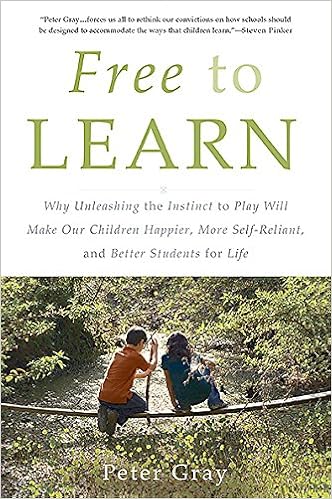Free to Learn by Peter Gray
- Children are capable of guiding their own learning. They understand themselves and will go as far as they feel comfortable but will limit themselves if they begin to feel incapable.
- Left on their own, children will play and that play will be educational. They learn all the time, even if (or maybe I should say because) no adult is "teaching" them.
- Play is play only when children have freedom--freedom to explore, freedom to change and adjust what they are doing, freedom to quit, freedom to ignore and do something else entirely.
- The way we do school in most cases is not conducive to optimal learning. Lots of things that are inherent in the school culture oppose the way children learn most effectively.
- Many adults do not have an appropriate view of the capability of children. They think children are more fragile and less able than they really are.
- Children learn more from one another (of different ages and abilities) than they usually do from adults. They do learn from adults, but more from watching and mimicking than from listening.
- Adults can be a resource and can offer help for children to make sense of what they are doing.
- If we want kids to be responsible, capable, helpful, cooperative, etc., we must allow them to practice these things on their own and in their own ways.
Most of these ideas are not completely new to me. Some things I knew have been affirmed. Some things I knew have been expanded and connected to other things. Some things have been challenged by meeting new information.
But what I do know: we must not give up advocating for children to be a part of their own learning. Play is important. Play is who children are--children of all ages. We must determine how we can make children and school/education get on the same page. (And it's not the children that need to change.)
I enjoyed reading this book. Well, I liked it at first. Then I questioned it and where it was going. And then I ended up seeing the whole and agreeing with it on the whole. It's definitely added to my knowledge of children, learning, and play.
All the reading/reflecting for Free to Learn is on the book's page here on Brick by Brick.



